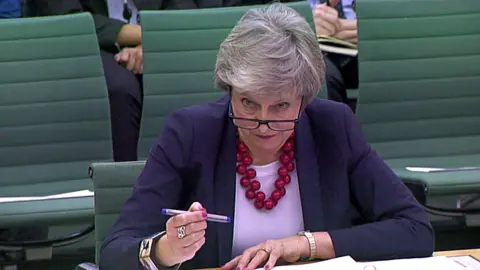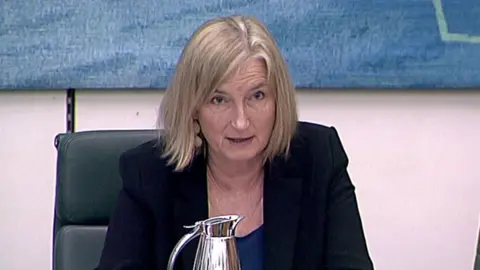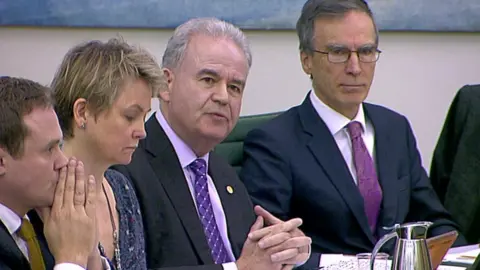Theresa May won't rule out 'no-deal' Brexit
 HoC
HoCTheresa May has refused to rule out a 'no deal' Brexit, if the deal agreed with the EU is rejected by MPs.
The PM was pressed repeatedly on the issue by MPs, amid Bank of England warnings it could trigger a recession worse than the 2008 financial crisis.
She said if MPs "voted down" her deal in December "then obviously decisions would have to be taken" and no-deal planning would be stepped up.
Jeremy Corbyn later told ITV that MPs would not allow a no-deal Brexit.
The Labour leader said: "The alternative isn't no deal. Nobody's going to allow no deal. How could we?"
Labour is hoping to force a general election or, failing that, another referendum, if, as is currently widely expected, MPs reject Mrs May's deal.
Mrs May was questioned by the Commons liaison committee, made up of the chairs of all select committees.
She refused to speculate about what she would do if MPs reject her Brexit deal on 11 December, saying she wanted MPs to "focus on the choice that lies in front of them" and ignore other potential options.
She also described calls for another referendum or delaying 29 March's departure date as attempts to "frustrate" Brexit.
Mrs May told the committee the only deal on offer was the one she had negotiated with the EU.
"This is an important point in our history. It is a vote on which we will be deciding whether we deliver on the decision of the British people," she told the MPs.
"What has been made clear from the European Union is that this is the deal that has been negotiated and this is the deal that people need to focus on when they are looking at the vote."
 HOC
HOCShe faced repeated calls to rule out a no-deal Brexit but declined to do so.
When Labour MP Rachel Reeves put it to her that leaving without a deal would be "catastrophic", Mrs May said the UK was leaving the EU in March 2019 and said she was promoting "a good deal":
She said: "When we come to the vote... it will be for Parliamentarians to determine whether they want to deliver on the vote that the British people took, whether they want to do that with a good deal - which actually does protect people's jobs into the future."
She added: "If the House were to vote down the deal that that has been agreed, given that the European Union has been clear this this is the deal that has been agreed... then obviously decisions would have to be taken in relation to the actions that would need to be taken."
Conservative Sir Bernard Jenkin questioned the Bank of England report and government analysis of Brexit's economic impact, suggesting they were "rubbish".
Asked by Conservative MP Sarah Wollaston about fears of medicine shortages and other impacts on the NHS of a no-deal Brexit, the PM said: "If anybody is concerned about these matters it is another reason to focus on the deal."
She claimed delaying Brexit for another referendum would lead to the re-opening of negotiations with the EU, something she said Brussels had ruled out.
But the main reason she was against another referendum, she told MPs, was that it would destroy trust in politics and lead to "more uncertainty and more division in this country".
Labour seek to change focus of vote
Labour has tabled an amendment to the vote on 11 December calling on MPs to reject Mrs May's "bad" Brexit deal.
It also calls on MPs to prevent "the chaos of the UK crashing out of the EU without a deal" and to "keep all options on the table to protect the UK from a no deal scenario, with a general election as the best outcome for the country".
If Labour fails to get MPs' backing for its Brexit proposals or a general election the party has said it will seek support for another referendum.
Attorney General Geoffrey Cox is to make a statement to MPs on Monday, on his legal advice to the government on its EU withdrawal agreement, ahead of five days of debate on the Brexit deal.
Labour's shadow Brexit secretary Sir Keir Starmer, told MPs: "The binding motion that was passed was for nothing less than the full and final legal advice provided by the attorney general, so it is wholly unacceptable, and frankly shows contempt for this House."
Corbyn on This Morning sofa
Earlier Mr Corbyn told ITV's mid-morning chat show Mrs May would lose 11 December's vote but "nobody is going to allow no-deal".
The Labour leader said his focus was on forcing a general election - and he conceded that it might take "some time" for an incoming Labour government to negotiate a fresh Brexit deal with Brussels - possibly up to two years.
He refused to say how he would vote if there was another EU referendum, saying: "It depends what the questions are."
He had agreed to ITV's proposal for a TV debate ahead of the Commons vote, he told host Philip Schofield, before Downing Street said Mrs May had agreed to take part in a debate on the BBC.
He also revealed that he had some sympathy for Mrs May because "leadership is a lonely place and that can be difficult".
Allow X content?

Is Brexit backstop 'like a post-war prefab?'
Allow X content?

Meanwhile, at the European Parliament
The EU's chief Brexit negotiator Michel Barnier has said Mrs May's Brexit plan "is the only possible deal".
He told the European Parliament: "We are not at the end of the process, which is going to go on being difficult."
He said he would "respect" the democratic debate in the UK, adding that British MPs would be considering a text "where the future of their country is at stake".
What's in May's deal?
- A legally-binding withdrawal agreement guaranteeing citizens' rights after Brexit, the £39bn "divorce bill", a 21 month transition period and "backstop" to prevent a hard Irish border if trade talks have not been completed by the end of the transition
- A 26-page "political declaration" setting out ambitions for a free trade deal with the EU and close cooperation in security and defence
MPs grill May on the details
 HOC
HOCConservative MP Julian Lewis, who chairs the defence committee, repeatedly asked the PM under what circumstances a hard Irish border would be erected.
Theresa May said ministers would do "everything in our power" to avoid a hard border, and emphasised that she could not speak for the Irish government.
Conservative MP Andrew Murrison asked if Mrs May's arrangement with the Democratic Unionist Party that keeps her in power was still in place, given that the DUP last week abstained on votes in protest at the EU withdrawal deal.
Mrs May said the confidence and supply agreement with the party "remains in place".
She added that she had had talks about the DUP's "concerns", but expected them to continue to support the government in the long run.
The SNP's Pete Wishart said Scotland would be worse off under the PM's proposed Brexit deal and "now is not the time" to "make us poorer".
Mrs May said her deal has the support of "employers and organisations in Scotland".
